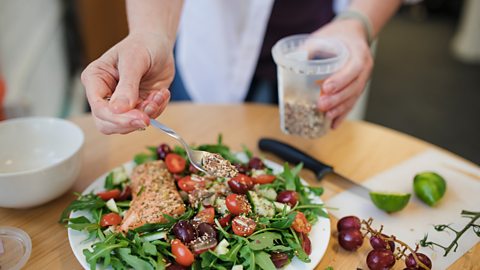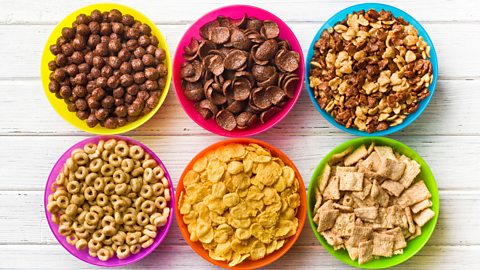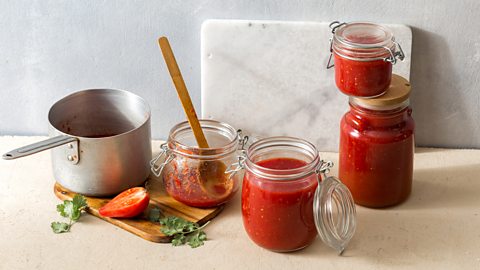Can changing your diet improve eczema and psoriasis?
A well-balanced diet can play a huge role in our health but can the foods we eat also impact common inflammatory skin conditions?
By Jessica Bradley

Inflammatory skin conditions are common, with one in five children and one in 10 adults in the UK living with eczema. Though much less common, around one in 50 people in the UK have psoriasis.
Both conditions can cause itchy and uncomfortable skin - and while there is no cure for either, there are various treatments available that can help some people manage their symptoms.
There are also several myths around the role diet plays in eczema and psoriasis, do these stand up to scrutiny? Here’s what the experts say…
How is diet linked to our skin health?
There are many ways our diet can play a role in the health of our skin, including our risk of developing acne and even skin cancer.
There’s also research to suggest that some conditions (including psoriasis) can be affected by chronic inflammation in the body. This is when the immune system detects a threat and kicks in to fight it off. Chronic inflammation can be influenced by diet.
Is obesity and a high-fat diet linked to eczema and psoriasis?
Claudio Mauro, professor of metabolism and inflammation at the University of Birmingham, has conducted research on the subject and found a relationship between obesity and a high-fat diet and inflammation in the body.
In 2017, Mauro and his team of researchers fed mice a-high fat diet for around eight weeks – which is the equivalent of seven or eight years in human years. He found that this diet exacerbated an inflammatory immune response in the mice.
“Our diet can lead to changes in body fat and this is a key risk for inflammation, especially when it accumulates around the stomach area,” he says.
However, Mauro has also found that omega-3 – which can be found in oily fish, vegetable oils, seeds and nuts – can have a preventative effect towards the body initiating an inflammatory response.
“There’s definitely an inflammatory component to skin conditions,” Mauro says, “And it’s a common observation that people living with obesity go on to develop skin conditions.” This includes both eczema – though not for those with the most severe eczema and psoriasis.
Low-fat chicken tikka masala
Could you improve your eczema and psoriasis symptoms by swapping to lower-fat versions of your favourite dishes, like this tikka masala?

The relationship between eczema and food allergies
Dietary fat and obesity aren’t the only ways our diet is linked to eczema. Those with eczema are also more likely to have food allergies.
“But we’re increasingly understanding that it’s not food allergies that cause eczema – it’s the other way around,” says Carsten Flohr, chair in dermatology and population health sciences at St John’s Institute of Dermatology at Kings College London and consultant dermatologist at Guy’s & St Thomas’ Hospital.
In around 70% of cases, eczema presents itself before the age of two. This, he says, is where parents – and their diets – can play a really important role in whether their children develop eczema.
There is a growing understanding, Flohr says, that babies can become allergic through the skin, in particular when they are massaged, or moisturiser is applied to their skin.
This is most likely because those applying the baby oil or moisturiser have traces of food protein on their skin, Flohr says, allowing the baby’s skin immune system to recognise the food as a danger signal, causing an allergy.
Research has found that allergies are largely prevented when children are orally exposed early to foods that commonly cause allergies, such as peanuts.
Easy hummus
This hummus can be made with peanut butter instead of tahini and if you remove the salt from the recipe, it could be a good weaning food.
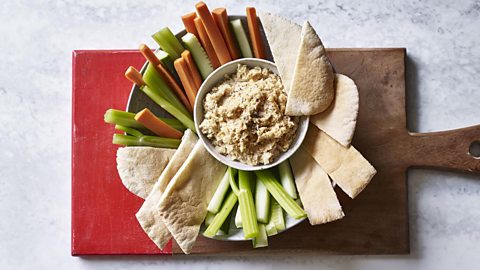
“If you wait too long before weaning your baby, there is a significantly higher risk of food allergies and we think this is most likely happening because there’s a higher chance of being exposed to foods through the skin, rather than by mouth.”
“Our immune system is programmed in a way that, if something is first seen by immune cells through the skin, it sends danger signals” Flohr says.
“This is where the diet of the parents comes into it, as it might well be on the parents’ hands, then onto the skin of the baby.”
While there is some evidence that breastfeeding can reduce the likelihood of a baby developing food allergies, there's also evidence stating it has little-to-no impact.
Related stories
Could the Mediterranean diet ease eczema and psoriasis symptoms?
There are many foods known to be anti-inflammatory , including tomatoes, olive oil, green leafy vegetables, nuts, oily fish and fruit.
Roasted vegetables with herbs and feta
Could Mediterranean diet recipes – like this Mary Berry one help lower inflammation in your body?
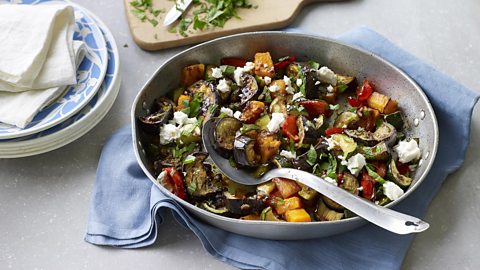
Along the same lines, the Mediterranean diet, which has a focus on vegetables, fruits, wholegrains and lean protein, has been linked to lower levels of inflammatory-causing proteins.
The diet also encourages eating oily fish, such as salmon and sardines, which contain omega-3 and are linked to reducing inflammation in the body.
Those with psoriasis have been reported to be at an increased risk of developing heart disease, so for this reason, researchers recommend adjusting their diet to minimise this risk.
Salmon is a source of omega-3 which could lower inflammation, here’s three ways you can cook it
But whether diet can directly help with eczema or psoriasis is a bit more complicated. While psoriasis is genetically determined – meaning that diet plays a much less significant role compared to eczema – there is a link between the disease and obesity and a western diet high in fat and calories, Flohr says.
Are probiotics helpful for eczema?
There is also some evidence suggesting that consuming probiotics during the latter stages of pregnancy can help to prevent eczema in children, Flohr says, but there’s little evidence to suggest it can help alleviate symptoms of eczema when it has already developed.
Yoghurt bark
To increase your probiotics in a tasty way you could make this yoghurt bark with a thick kefir
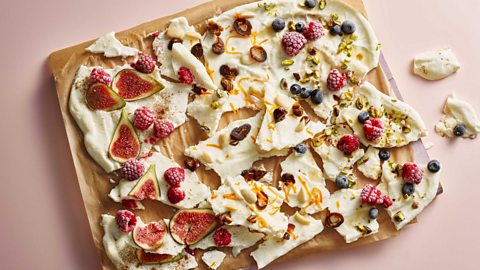
Researchers recommend speaking to a medical professional if you are concerned about any skin condition and have questions regarding the role your diet may play in your symptoms or risks.
Originally published July 2024
